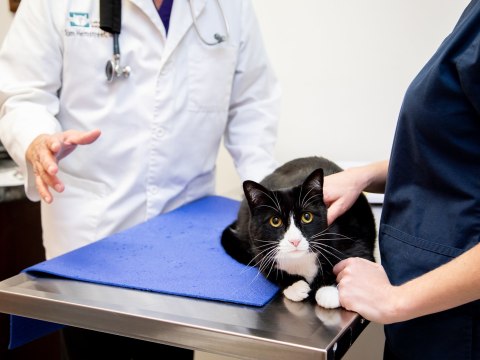That time of the year when the weather turns colder often brings illnesses for pet parents and their dogs. For pet parents, human strains of influenza are most common in the fall and winter. However, there is a canine influenza, also called “dog flu” that’s also common and is around most of the year.
Connect with a verified veterinarian in minutes. Licensed vets are available 24/7 to answer your questions. No need to worry about your furry family member.
Canine Influenza
Can dogs get the flu? Yes, but only the doggie version. First, two things to know: dog flu is not transferred to humans (in other words, it won’t make your sick), and dogs generally don’t catch human influenza strains. So, canine influenza only affects dogs. Much like human influenza, dog flu is also caused by viruses. There are two viruses that cause doggie flue: H3N8 & H3N2. These viruses were first identified in Asia, and later spread to other parts of the world. Both dog flu bugs are highly contagious amongst dogs, making it a problem for places where lots of dogs are boarded, such as boarding kennels, shelters, etc. The viral infections are spread through coughing, sneezing and barking. Once on a surface, the viruses can live for up to 48 hours. Prime surfaces for canine influenza include kennel surfaces, water and food bowls, collars, harnesses, leashes, etc. Whatever is contaminated with the virus has the chance of spreading the infection.
While people can’t catch dog flu, they can be carriers. The virus can live on our clothes for up to 24 hours and live on our hands for 12 hours.
If you’re around multiple dogs, it’s possible to spread the virus from one dog to another simply because you didn’t wash your hands or put on clean clothes.
Signs & Symptoms of Dog Flu
Dogs infected with either virus can show signs of illness as soon as 2-3 days after exposure. That’s a fast incubation time, which makes it very easy for one sick dog to quickly infect other dogs. The signs and symptoms of canine flu include:
- Mucus from the nose/eyes
- Cough (either dry/hacking or quiet)—the cough can last from 10-21 days.
- Sneezing
- Watery eyes
- Exhaustion
- Fever
- Decreased appetite
- Difficulty breathing
Just like human flu, canine influenza can be mild or severe, depending on the dog’s condition and overall health. Most dogs will be sick a few days and then be over the flu. However, puppies, dogs with weak immune systems and other health problems, or senior dogs can become quite sick with the dog flu. Some dogs may develop a secondary infection such as pneumonia. Dogs that have short snouts or tiny nostrils are more prone to developing the severe form of dog flu. These dogs easily develop respiratory problems, such as pneumonia. If you believe your dog has been exposed to canine influenza and is showing signs of illness, then it’s a good idea to get him to the vet as soon as possible. Your vet can administer a test that will tell if your dog is sick with the dog flu or not. If so, then your dog will need to be quarantined from other dogs for at last 21 days.
It’s important to note that about 20% of dogs may show no signs of being ill with canine influenza; however, they can still spread the infection to other dogs. Treatment of canine influenza is much the same as for humans—it involves hydration, fever reduction medications (not humans meds, but anti-inflammatory medications safe for dogs) and possibly antibiotics if the dog has a secondary bacterial infection.

Review symptoms, medications & behavior to keep your pets healthy with a Vet Online in just minutes.
Ask a Vet Live NowDog Flu Prevention
How can you keep your dog safe from catching canine influenza? If there’s an outbreak in your area or at your dog’s day care or kennel, then the best thing you can do is keep him home until the virus dies out. It’s also best to keep your sick fur baby at home to keep him from infecting other dogs. Follow your vet’s recommendations, but generally dogs should be quarantined for about 21 days to ensure they’re free of the infection. Another thing you can do is to make sure your dog’s kennel, day care, boarding facility all require dog flu vaccinations for all dogs. And don’t forget to wash your hands and change clothes if your dog is sick. You’ll keep the virus from spreading and keep from making other dogs sick.
If your pup attends doggie daycare or is routinely in kennel, etc., then it’s a good idea to make sure the establishment practices good hygiene. Good hygiene means that all surfaces of the kennel are thoroughly cleaned with the right disinfectants. In addition, food and water bowls need to be disinfected on a daily basis. Dog toys, brushes, leashes, etc. should not be shared between the dogs in the kennel.
Any dog that is showing signs of illness should be completely separated from the other dogs, in order to avoid the possible transmission of disease.
Dog Flu Vaccines
As noted above, it is possible to have your dog vaccinated against both strains of canine influenza. The vaccines are for H3N8 and H3N2 (separately); however, there’s also a vaccine that offers protection from both viruses. The vaccines don’t keep your dog from catching doggie flu; however, they will reduce his risk of catching the flu. The vaccines also help keep the flu from becoming more serious, so the duration and severity are usually reduced. Healthy dogs, aged seven weeks and older, can receive the vaccine. It will require two vaccinations that are given 2-4 weeks apart. It usually takes about 2 weeks for the vaccine to take effect.
It’s important to note that not all veterinarians keep the dog flu vaccine on hand; it’s a good idea to call your vet ahead of time so they can order the vaccine and have it ready when you need it.
Does My Dog Need Flu Vaccine?
That’s a good question, and the answer is—it depends. Most experts recommend only the vaccination of healthy dogs. This means dogs who are not seniors and have no underlying health issues. However, dogs that frequent kennels, groomers, boarding, daycare facilities, etc. are good candidates for getting the flue vaccine. Dog flu can easily and quickly spread in facilities of this type, so if your dog frequents these types of establishments, it’s probably a good idea to get him vaccinated.
It’s also a good idea to vaccinate your fur baby if he has a weakened immune system, other chronic health issues, is older, etc. He will definitely benefit from the protection the dog flu vaccines can offer him. Be sure to contact your vet if you have any questions about whether or not your dog needs to be vaccinated against canine influenza. Your vet knows your dog and his health better than anyone and will be the best person to offer you guidance and advice.
How Do Dog Flu Vaccines Work?
The vaccines use killed/inactive viruses along with other substances that work to boost the immune system. The mechanism that works to protect the dogs treated with the vaccine are not understood. In pet parents, the human flu vaccine works by producing antibodies that work against different flu antigens.
No one completely understands how the canine vaccines work against dog flu in canines.
Dog Flu Vaccine 2020
This year, there are three different types of vaccines available to fight dog flu. These are:
- Nobivac (by Merck Animal Health): works against both H3N8 and H3N2 viruses
- Monovalent vaccines (again by Merck Animal Health): one vaccine works only against H3N8, while the other works only against H3N2
- Vanguard (by Zoetis): offers the same three vaccines
Each of these vaccines is effective for protecting your fur baby from dog flu.
Dog Flu Vaccine Side Effects
Most dogs can safely receive dog flu injections. However, it’s important to understand that your dog may experience side effects after receiving the dog flu vaccine. The most common side effects include:
- Lethargy
- Fever
- Loss of appetite
- Nausea
- Digestive problems
- Swelling and/or discomfort at the site of the injection
- Hives (an allergic reaction)
- Skin rash
While any dog can experience these side effects, they’re most often seen in smaller dogs. If you notice that your dog isn’t feeling better about 3 days after the injection, then it’s a good idea to call your vet and get your dog checked. The side effects can be concerning, but most dogs can safely be treated with the available vaccines. You and your vet have to weigh the options, your dog’s overall health and age, along with the prevalence of dog flu currently in your area as to whether or not the shot will be beneficial for your canine companion.
Flu Shot for Dog Cost
The cost of the canine influenza vaccine can vary—our research showed the cost can be as low as $20-$30 total (2 vaccinations, 2 weeks apart), or as high as $40 for one injection. The price depends on your area, if the vaccine is readily available or has to be ordered, etc. Some experts do not recommend dogs get the flu shot; however, if your dog does become very ill with the dog flu and a secondary bacterial infection, then hospitalization and treatment will quickly become more expensive than the dog flu shot.
While canine influenza is generally a mild illness in most dogs, it can quickly become severe in dogs with low immunity and other underlying health problems. Dog flu vaccines are helpful and offer some protection, but do come with possible side effects. It’s a good idea to check with your veterinarian to see if they recommend your dog getting the canine flu shot. While the cost can be expensive, depending on your area, the cost of the shot may outweigh the cost of treatment and hospitalization if your dog becomes severely ill with canine influenza.
Connect with a verified veterinarian in minutes. Licensed vets are available 24/7 to answer your questions. No need to worry about your furry family member.

Julie
Julie is a graduate of the University of North Carolina, Wilmington, where she studied Animal science. Though contrary to the opinion of her parents she was meant to study pharmacy, but she was in love with animals especially cats. Julie currently works in an animal research institute (NGO) in California and loves spending quality time with her little cat. She has the passion for making research about animals, how they survive, their way of life among others and publishes it. Julie is also happily married with two kids.
Review symptoms, medications & behavior to keep your pets healthy with a Vet Online in just minutes.
Ask a Vet Live Now



